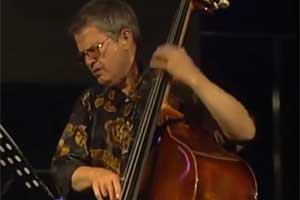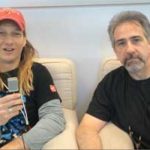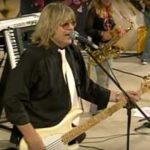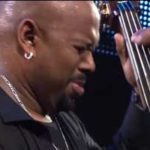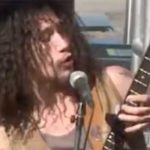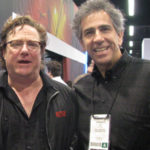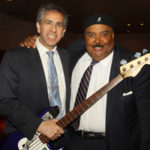From the earliest days of his family’s radio show to Ornette Coleman, the Liberation Music Orchestra and Quartet West, jazz giant tells his whole story!
Exclusive interview with FBPO’s Jon Liebman
September 5, 2011
Time magazine has hailed jazz legend Charlie Haden as “one of the most restless, gifted, and intrepid players in all of jazz.” Throughout the course of his career that has spanned over five decades, Charlie Haden has become one of the most influential bassists, composers and bandleaders in modern music, his influence cutting across multiple genres, from free jazz and avant garde to vintage country and rock & roll.
Haden was an original member of Ornette Coleman’s groundbreaking quartet that turned the jazz world on its head in the late the 1950s. He is also the founder of the politically charged Liberation Music Orchestra and California-based Quartet West. Through his long association with Coleman, Charlie has collaborated extensively with Don Cherry, Billy Higgins, Ed Blackwell and Dewey Redman. He has also performed and/or recorded with jazz icons John Coltrane, Archie Shepp, Chet Baker, Joe Henderson, Carla Bley, Pat Metheny, Michael Brecker and Jack DeJohnette, as well as pop musicians Yoko Ono, Ricky Lee Jones, the Minutemen, Vince Gill and Elvis Costello. Haden also founded the Jazz Studies program at California Institute of the Arts, where he emphasizes the spirituality of improvisation.
In 2008, Charlie was the subject of a tribute recording and documentary film, both titled Rambling Boy, recounting the Haden family’s legendary radio show, in which Charlie participated from the time he was less than two years old.
Charlie Haden has amassed a long list of awards, honors and distinctions, including a Guggenheim Fellowship, several NEA grants, three GRAMMY awards and over fifteen GRAMMY nominations. In 2011, Charlie was given the International Society of Bassists’ Special Achievement Award for Jazz Performance, “presented biennially to recognize those who have contributed their special talents, knowledge and support to furthering ISB ideals.” Most recently, Charlie received the 2012 NEA Jazz Master Award, the nation’s highest honor in jazz.
FBPO: You’ve been immersed in the music world from a very young age. What are your earliest childhood memories?
CH: Going to the radio station when I was 22 months old, going into the studio and watching my mom and dad choose the songs they were going to do, and my brother and sister, and the red light going on. We’d go on the air and do the radio show. At that time, I was pretty young, so my mom usually held me when I would sing, but later on I stood on a chair to reach the mic. I remember those vivid memories. Very good memories.
FBPO: You remember being 22 months old?
CH: Yessiree! My mom told me that she was rocking me to sleep one day and humming and I started humming the harmony. She said, “When you started humming the harmony, I knew you were ready for the show.”
FBPO: Did you think of it as “Show Business,” or was it just what your family did?
CH: I was surrounded by music every day like that. We had radio shows every day, in the morning and then in the evening, and we did that up until I was 15. I got bulbar polio when I was 15. At the time, we had a TV show in Omaha, Nebraska. The polio paralyzed my vocal chords and my throat and I wasn’t able to sing. So I started concentrating on playing the bass.
FBPO: Is that why you became a bass player, because you couldn’t sing any more?
CH: Yeah, that’s one of the reasons. I loved to sing and I also loved bass because my older brother played bass on our show. When he wasn’t there, I noticed that the fullness of the music stopped. I really liked that deep sound, so I migrated to his bass as often as I could. I’d wait till he left and I’d go in his room and I’d play the bass with the jazz records.
FBPO: Who were some of your influences as an up-and-coming bass player? Which of those jazz records did you listen to?
CH: I loved Jimmy Blanton. He was one of the first bass players I remember listening to. Him and Wellman Braud, the guys that were playing with Duke Ellington. Also Don Bagley, the bass player with the Stan Kenton orchestra. There weren’t that many bass players who were influencing me, though, because I was also influenced by classical composers like Bach. My main influence in jazz was Charlie Parker. I was also influenced by musicians and people who were compassionate about life, like Martin Luther King and some of my other heroes. They really influenced me in a deep way.
My family influenced me very deeply because my dad came from a musical background, from the hillbilly music part of it, and all that music came over from Scotland and Ireland and England in to the Appalachian Mountains and Ozark Mountains, where I was raised. I was very lucky to be born into that because it’s a big part of the creative culture that this country had, especially in the South and in the Midwest, where jazz comes from, and also where blues comes from, from the underground railroad. Many people think of that as evolving along with improvised music. It’s really something to think about because there are two art forms that are indigenous to this country that couldn’t have been born anywhere else, kind of similar to the movie pioneers that made the first films. They had nothing to go by, they had no role models. They were just doing it. The same thing happened with the music that came out of New Orleans and went into Chicago. I think about that stuff a lot and I read about it a lot and I wish I could have been there. That’s why I make all these records. I have all these old soundtracks that I put on my records so I can pretend that I was there.
FBPO: What prompted you to move to Los Angeles?
CH: I was going to high school in Forsyth, Missouri, population 400. There were thirty students in my graduating senior class and most of the guys were future farmers of America. I used to take them by our house and play Charlie Parker and Billie Holiday records for them and they thought I was out of my mind! They had never heard anything like that.
Before I went to LA, I had originally planned to go to New York. In fact, I had a full scholarship for four years to the Oberlin Conservatory in Ohio and I turned it down because I found out, first of all, that Oberlin didn’t have a jazz studies program. I wanted to go to a school that had jazz and there weren’t that many back in 1956. [Editor’s note: See our interview with present-day double bassist and professor of Jazz Studies at Oberlin, Peter Dominguez.]
There was this place, along with Berklee in Boston, called Westlake College of Modern Music and it was in LA. I played bass for, oh man, maybe a year on The Ozark Jubilee, which was a television show that originated in Springfield, Missouri. Eddy Arnold was there and so was Red Foley. Eddy Arnold’s guitar player was Hank Garland, who was a jazz player and Red Foley’s guitar player was Grady Martin. All those guys were jazz fans and they kept telling me to get out of Springfield because they knew I wanted to play jazz. I was listening a lot to Hampton Hawes, who was my favorite pianist, and I was bound and determined to play with him. So I applied and got a scholarship to Westlake and got on a Greyhound bus and went to LA and started playing.
FBPO: Did you take an upright bass with you on that bus?
CH: I had my bass with me on that bus! They tied it up on the top of the bus. I’m just glad it didn’t rain! It was the end of August, like around now, only over fifty years ago! It was an old Kay. I started working right away and started cutting classes because I was getting in late and not doing all my homework. I met Red Mitchell, who was playing bass with Hampton Hawes. I was doing my homework one night at a drive-in on Sunset called Tiny Naylor’s and he came in. It was about three in the morning and I went up to him and I said, “Man, you’re great!” And I said, “You play with my favorite pianist,” and he said, “Yeah, well, come by my house, man. We’ll play.”
So I started going over to his house and he’d play piano and I’d play bass with him. And one day he called me and said, “I’ve got this gig in East LA at a club called the Diggers Club with Art Pepper and I can’t make it the rest of the weekend ’cause I’ve got a record date. Come on and sit in with us. I know when Art hears you he’ll ask you to play.” So I went and I played and, sure enough, he said, “Come out and play the rest of the week.” That night when I was there, Sonny Clark was playing piano. When I showed up the next night, Hampton Hawes was playing piano. That’s how I met him.
FBPO: I bet that was quite a culture shock for you, living in LA, after having grown up in Iowa and Missouri!
CH: Yeah, but you know, the culture’s in you when you come into this world. Sometimes I say I must have been delivered to the wrong planet. This isn’t the planet for me because I want to be around people who are really deep human beings that care about art and creativity. That’s why I really love jazz musicians, because that’s who they are. The guys playing jazz, you know, and even people who love jazz and listen to it, are special people who have great ears and, because they have great ears, they also have great eyes. They love painting and they love dance. They love the arts. I loved being in LA at that time because there were a lot of jazz musicians there and I got to play with Hamp and Dexter Gordon and Russ Freeman and Chet Baker.
I met Scotty LaFaro right away, too. We were roommates and he became my closest friend in life. Oh yeah, man! His sister, who wrote this book [Jade Visions: The Life and Music of Scott LaFaro, by Helen LaFaro-Fernandez, University of North Texas Press], used to come over to our apartment in Hollywood. Scott and I were very, very close and I remember the day he came running in to the apartment and he said, “Man, I just got this record! You gotta hear this piano player! He’s so great. I’ve got to play with him some day!” It was Bill Evans’ first record.
We’re living in a dehumanized society now, a dehumanized culture, witnessing the commercialization and corporatization of our culture right before our eyes. It’s not just with music. It’s in everything. Sometimes I wish I could go to the planet where I was originally supposed to have gone, but then I realize that music and the arts fulfill a very important function on this planet. We can never give up trying to make this world better!
FBPO: Tell me something about Ornette Coleman. You must really know him better than almost anybody else.
CH: Ornette Coleman. I probably know him better than most people. We are very close. I met him when he came in to this club on Wilshire Boulevard, called the Hague, over by MacArthur Park. He sat in and the musicians asked him to stop playing as soon as he started playing. I tried to meet him, but he left right away and I couldn’t get to him in time. And on my gig the next night, I was playing with Paul Bley at a club called the Hillcrest Club. The drummer’s name was Lenny McBrowne. He was a New Yorker and he was always telling me to go to New York. I told him I heard this alto player, man, and he said, “Did he play a plastic alto?” I said, “Yeah.” He said, “That’s Ornette Coleman! I’ll bring him in and introduce you to him.” So he brought him to the club and that’s how we met.
FBPO: You weren’t in L.A. very long. What made you decide to move to New York at that time?
CH: Well, we were playing every day at Don Cherry’s house and we made two records at that time, one called The Shape of Jazz to Come, the other one called Change of the Century. We had just met Nesuhi Ertegun, who was the Ahmet Ertegun’s brother. Ahmet was the pop guy and Nesuhi was the jazz guy. And he asked Ornette, “Would you guys like to go to New York?” I had always wanted to go to New York. I originally came out to LA to go to school and to see if I could play with Hamp, but this was an opportunity to go and nobody was playing or approaching music the way that we did.
When we all met, Ornette and I and Don Cherry and Billy Higgins, we were in the right place at the right time to meet. We all were feeling the same way about music, probably similar to the way that Bird and Diz and the bebop guys felt when they revolutionized jazz. It was the same way with us, if you think about it. I was ready to go to New York and I went. We turned it upside down!
FBPO: Tell me about the Liberation Music Orchestra. It was more than just the music that inspired that band, wasn’t it?
CH: Yeah, it was having an empathy and feeling for people who were struggling to live in a free society and the music that came from those struggles. I didn’t feel good about what was going on in Viet Nam. I didn’t feel good about what was going on in the country, politically. And so, when the U.S. bombed Cambodia, I decided to do a record to express my concerns musically. I called Carla Bley, who was a friend for many years before that because she was married to Paul when we were playing at the Hillcrest Club in 1957. She’s a great arranger, pianist and composer. I told Carla what I wanted to do and she really loved the idea.
I had a lot of songs and records from the Spanish Civil War in 1937, where the people Spanish Republicans were fighting against Franco, who was a fascist and a friend of the Nazis in Germany. When that civil war started, it was a way for them to try out their new weapons, a way for Hitler to try out his new weapons. There was a feeling that if the United States and England had helped the people in Spain to fight Franco and defeated him before he even got off the ground, there probably wouldn’t have been a World War II. Things would have been a lot different. But nobody helped them and Franco defeated the Spanish People’s Republic and that became a fascist nightmare.
The Liberation Music Orchestra is very important to me. In fact, I’m thinking about doing another record because the last one we did, Not in Our Name, was in reaction to the invasion of Iraq. That’s how the Liberation Orchestra started, because I wanted to express my concerns about what was going on in the country, politically, and that’s what I decided to do. Anyway, we gotta keep the music going, man.
FBPO: Somehow, you ended up back in LA again. Was that when you established the Jazz Studies program at Cal Arts? Is that what took you back there?
CH: I was in and out of LA a lot, but I lived in New York for twenty years. I came back to LA in the early ’80s because I wanted to be near my kids. I was traveling to Los Angeles a lot and I met my present wife, Ruth Cameron, who wanted me to start a band and stay in LA because I was always going to New York and traveling all over the world. She said, “You know, there are some great musicians here. You can start a quartet,” which I did. And she named the band Quartet West. It turned out to be one of the best bands in jazz and we’re still rolling.
And in 1982, the then Dean of Music at Calarts, Nicholas England, liked what I had to say about music and life and improvisation and asked me to start a jazz program. I wanted it to be about finding your individual voice on your instrument and focusing on smaller groups and improvisation and he said that would be perfect for Calarts. Thus, with the help of many devoted and talented teachers and visiting artists, the program has developed into a great program, where one can now even get a doctorate in music. My class focuses on the Spirituality of Improvisation.
FBPO: Who’s on the new Quartet West recording?
CH: In addition to the regulars, Ernie Watts on sax and Alan Broadbent on piano, we have the young drummer from New York, Rodney Green, taking over for the great Larance Marable who’s been ill. We just finished making an album called Sophisticated Ladies, with Diana Krall, Norah Jones, Renée Fleming, Cassandra Wilson, Melody Gardot and my wife, Ruth Cameron, and strings. I’m very happy with it. It’s a follow-up to our earlier recording, Art of the Song, with Shirley Horn and Bill Henderson. It gives us a chance to explore little-known gems from the American songbook with great younger singers.
FBPO: I bet a lot of people would be surprised to know that you’ve also played with Yoko Ono, Ginger Baker, Ringo Starr, Beck, Ricky Lee Jones, the Minutemen, Vince Gill, Roseanne Cash and Elvis Costello. So many genres, from free jazz, avant garde, rock & roll, country, gospel… Which one(s) truly move you the most?
CH: I don’t believe in categories. I believe in beautiful music coming from the heart. And if it’s coming from the heart and it’s meaningful music to make the world a better place, then that’s wonderful. So, it really doesn’t matter what you call it. It matters that it’s really beautiful and that it touches somebody’s life in a positive way.
FBPO: How did you feel when Rambling Boy came out? It must have brought back some very powerful memories!
CH: Yeah, I was real proud of my daughters and my son and my wife, Ruth. My kids are all musicians. They work more than I do! Josh has a great band called Spain. He’s a good bass player and singer, too. Rachel is the other bass player with a beautiful sound. She’s one of my triplets. I have triplet daughters.
FBPO: Yes, I know.
CH: Petra plays with everybody and Rachel plays with everybody. Tanya, who is a wife and mother and who also has a great voice and plays cello in several bands, concentrates on painting now. They sang so great on my record, Rambling Boy. I was really proud.
FBPO: You should be! Congratulations also on being selected as a 2012 NEA Jazz Masters Award recipient. That is quite an honor and well deserved!
CH: Well, thank you very much.
FBPO: Could you comment on your reaction to having been chosen?
CH: I was very honored, especially since I found out that that was the last year it was going to be. The NEA lost their funding for that so there won’t be any more Jazz Masters. There are so many great jazz musicians who deserve to be honored, so we need to work to bring the award back.
FBPO: Well, congratulations nonetheless.
CH: Thank you. I have to emphasize that I couldn’t have done any of this without my wonderful wife Ruth. She is my co-producer, my manager and my soul mate. I’m a very lucky person because she’s seen me through some difficult times.
FBPO: What’s next for you? What else can we look forward to seeing and hearing from Charlie Haden? I think I read somewhere you’re working on a book?
CH: I’m working on a book. Swiss TV just did a documentary about my life called Rambling Boy, so I’ve been at many film festivals. It hasn’t been cleared for US distribution yet, but it’s been on German TV and has been seen in Europe. It’s got some great pictures of my dad and mom and the country radio show. I just did a duet record with my long-time friend, Keith Jarrett, called Jasmine, that I love.
FBPO: I have a duo record of you with Hampton Hawes from many years ago, which I enjoy very much.
CH: Oh yeah, that’s a good one!
FBPO: What’s this book you’re working on? What kind of book is it?
CH: It’s about life and music. It’s about the way I feel about life, my family and like that.
FBPO: You have a very famous son-in-law: Jack Black. Do you think people have any misconceptions on what kind of person he is? I mean what’s Jack really like?
CH: He’s a great guy, great actor and musician, very talented. He’s also a great father to my grandsons and a great husband to my daughter, Tanya. He loves her very much and I couldn’t be more proud of him.
FBPO: Have you ever thought about what you’d be if you weren’t a bass player/composer/bandleader, etc.?
CH: Hmm… No, I’ve never really thought about that because I can’t imagine doing anything other than what I am doing. That’s what I love to do and that’s how I feel I can contribute to the world to make this planet a better place.
